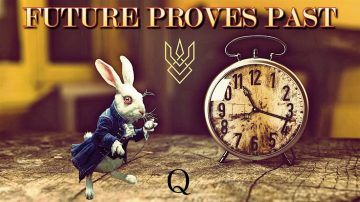Paige K. Bradley at Artforum:
 To fixate on the question of Q’s identity would be, in the conspiracist’s parlance, to chase a false flag. And a group curiously close to Q would likely say the same: the leftist Italian literary collective Wu Ming, a pseudonym translating to “anonymous” or “no name,” which was formed in 2000 as an outgrowth of Luther Blissett, a nom de plume for the same circle of coauthors. In 1999, Blissett published Q, a historical-adventure novel set during the sixteenth-century Protestant Reformation that follows an anonymous Anabaptist radical as he is pursued around Europe by Q, a Roman Catholic spy. In a December 2002 essay posted to its website, Wu Ming declared, “We are interested in ﹡mythopoesis﹡, i.e. the social process of constructing myths, by which we do not mean ‘false stories,’ we mean stories that are told and shared, re-told and manipulated, by a vast and multifarious community, stories that may give shape to some kind of ritual, some sense of continuity between what we do and what other people did in the past. A tradition.” This sounds uncannily similar to QAnon’s story for the people. Q often claims that “Future proves past,” setting its readers up to understand time as a circular process, and, in a sense, it’s not wrong. Time ceases to be progressive in Q’s realm, and on the world stage, ancient crimes and sins are eternally recurring eruptions that must be quashed anew by righteous armies in recycled costumery. Anyone with a taste for devotion and a capacity for faith is a potential conscript. Someone, somewhere, is laughing their head off at their joke, having inflamed all sides in a war for what’s true and who’s accountable for it. No need to bother with guillotines when heads are already lost. And here fall the rest of us down rabbit holes that never end, while others await the longed-for storm, not realizing they have drowned beneath its waves.
To fixate on the question of Q’s identity would be, in the conspiracist’s parlance, to chase a false flag. And a group curiously close to Q would likely say the same: the leftist Italian literary collective Wu Ming, a pseudonym translating to “anonymous” or “no name,” which was formed in 2000 as an outgrowth of Luther Blissett, a nom de plume for the same circle of coauthors. In 1999, Blissett published Q, a historical-adventure novel set during the sixteenth-century Protestant Reformation that follows an anonymous Anabaptist radical as he is pursued around Europe by Q, a Roman Catholic spy. In a December 2002 essay posted to its website, Wu Ming declared, “We are interested in ﹡mythopoesis﹡, i.e. the social process of constructing myths, by which we do not mean ‘false stories,’ we mean stories that are told and shared, re-told and manipulated, by a vast and multifarious community, stories that may give shape to some kind of ritual, some sense of continuity between what we do and what other people did in the past. A tradition.” This sounds uncannily similar to QAnon’s story for the people. Q often claims that “Future proves past,” setting its readers up to understand time as a circular process, and, in a sense, it’s not wrong. Time ceases to be progressive in Q’s realm, and on the world stage, ancient crimes and sins are eternally recurring eruptions that must be quashed anew by righteous armies in recycled costumery. Anyone with a taste for devotion and a capacity for faith is a potential conscript. Someone, somewhere, is laughing their head off at their joke, having inflamed all sides in a war for what’s true and who’s accountable for it. No need to bother with guillotines when heads are already lost. And here fall the rest of us down rabbit holes that never end, while others await the longed-for storm, not realizing they have drowned beneath its waves.
more here.
